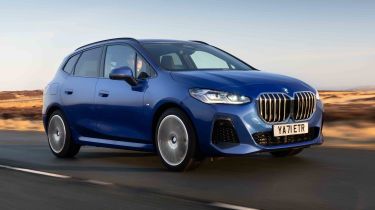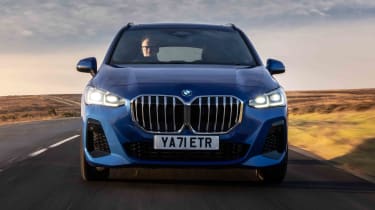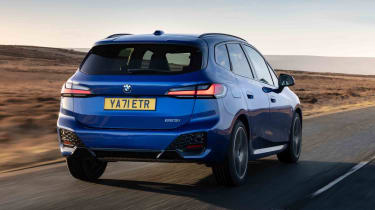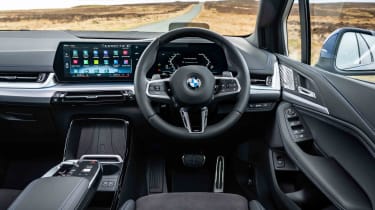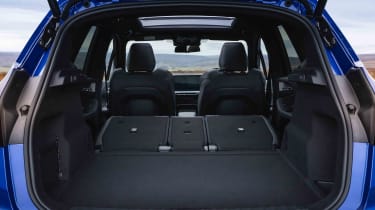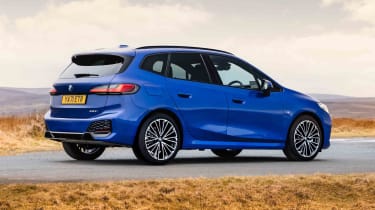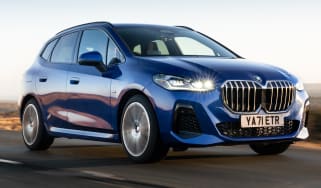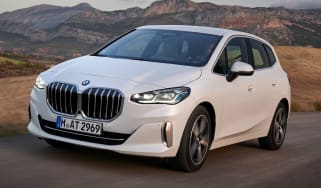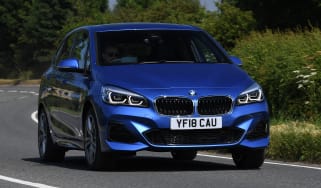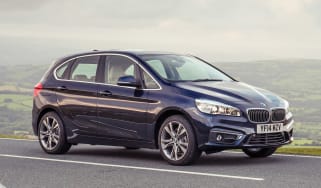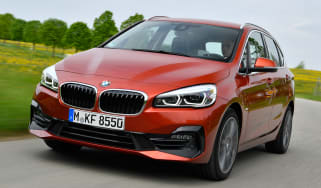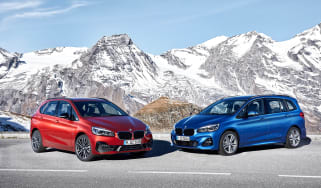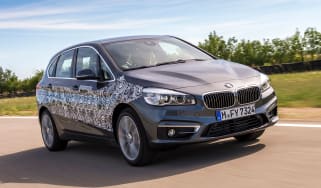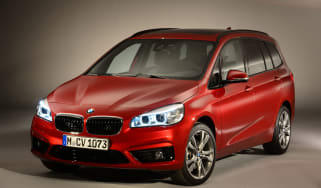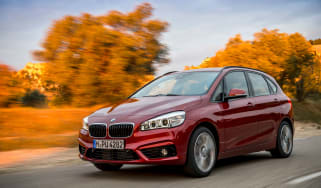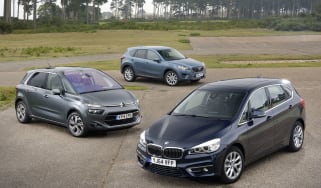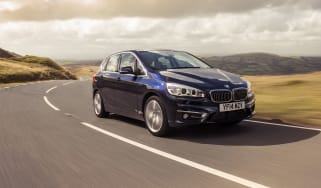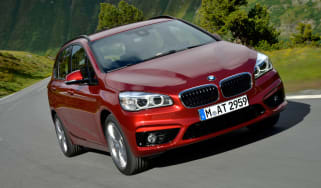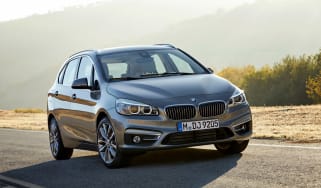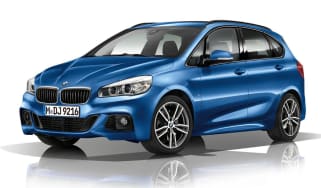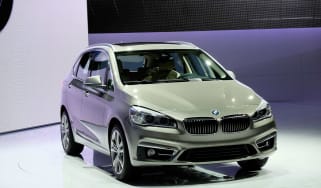BMW 2 Series Active Tourer review: posh family MPV with plug-in hybrid power
The BMW 2 Series Active Tourer is spacious, efficient, well-priced, and comes with company car friendly plug-in hybrid versions

It’s welcome to find that the BMW 2 Series Active Tourer continues on despite what is a dwindling class, because it gives buyers another genuinely premium multi-purpose vehicle (MPV) option, avoiding the need to resort to one of those SUVs. We’re impressed with the space inside and the quality of its interior, plus the mild-hybrid tech brings efficiency benefits over its main rivals.
Remarkably, the price is reasonable, too, coming in at less than it would cost you for a Volkswagen Touran and Mercedes B-Class. Having said that, the former comes with the additional versatility of seven seats, and while the technology of the 2 Series Active Tourer is impressive, we can’t help but feel usability has been compromised by the loss of physical controls for both the air-con system and the iDrive infotainment.
|
Key specs | |
|
Fuel type |
Mild-hybrid petrol, plug-in hybrid |
|
Body style |
Five-door MPV |
|
Powertrain |
1.5-litre 3cl turbo petrol MHEV, front-wheel drive 2.0-litre 4cyl turbo petrol MHEV, front-wheel drive 1.5-litre 3cl turbo petrol PHEV, four-wheel drive |
|
Safety |
5-Star EuroNCAP (2022) |
|
Warranty |
3yrs/unlimited miles |
BMW 2 Series Active Tourer: price, specs and rivals
It seems hard to believe that BMW would be among the last remaining holdouts of the MPV. However, some 430,000 examples of the previous generation of BMW 2 Series Active Tourer have been sold, with the Munich manufacturer claiming it’s a great way of bringing new customers to the brand. It all makes the introduction of this second-generation version a worthwhile move.
It’s especially lucrative since the 2 Series Active Tourer uses the group’s FAAR platform that’s shared with the latest BMW 1 Series, BMW 2 Series Gran Coupe, the BMW X1, BMW X2, and MINI Countryman, all helping to keep costs down, and helping to keep the price of this BMW reasonable.
Used - available now

2020 BMW
2 Series
28,186 milesAutomaticPetrol1.5L
Cash £16,800
2020 BMW
2 Series
59,343 milesAutomaticDiesel2.0L
Cash £12,887
2025 BMW
2 Series
51,528 milesAutomaticPetrol2.0L
Cash £19,787
2021 BMW
2 Series
32,770 milesAutomaticPetrol2.0L
Cash £17,287This also means a full EV is possible, but, for now, the firm is offering two versions of plug-in hybrid, the 225e and 230e, and two versions of mild-hybrid with the 220i and 223i. Plug-in hybrid models come with four-wheel drive xDrive tech, while the two mild-hybrids are front-wheel drive only. All versions come with a seven-speed automatic transmission to make everyday driving, such as the school run, that little bit easier.
Three trim levels are available: Sport, Luxury, and M Sport. Entry-level Sport has 17-inch alloy wheels, an electric tailgate, automatic LED headlights, rain-sensing wipers, front and rear parking sensors, sat-nav, and full smartphone connectivity. Mid-range Luxury would be our choice because it adds the open-pour wood and Vernasca artificial leather seat trim to the classy interior. It also gives you more comfortable front sports seats with additional adjustment for not much more money – plus they’re heated, too. The top-of-the-range M Sport provides keyless entry, some Alcantara trim to the seats, adaptive LED headlights, and wireless phone charging.
Prices for the 220i Sport start from just over £34,000, which is over £1,000 less than the entry-level Mercedes B-Class. Even the more potent 223i Sport at just under £37,000 still undercuts the entry-level Volkswagen Touran. The plug-in hybrid models aren’t quite such good value, starting at just over £40,000 for the 225e Sport, and just under £45,000 for the 230e Luxury. That being said, the low CO2 emissions of these models have added Benefit-in-Kind (BiK) benefits for company car drivers that none of its rivals can match.
Engines, performance & drive
|
Model |
Power |
0-62mph |
Top speed |
|
BMW 2 Series Active Tourer 220i Sport |
168bhp |
8.1 seconds |
137mph |
|
BMW 2 Series Active Tourer 223i Sport |
215bhp |
7.0 seconds |
150mph |
|
BMW 2 Series Active Tourer 225e Sport |
242bhp |
6.7 seconds |
121mph |
|
BMW 2 Series Active Tourer 230e Luxury |
322bhp |
5.3 seconds |
127mph |
The range starts with what’s predicted to be the best-seller, the 220i. Despite the badge, it’s actually a turbocharged three-cylinder, 1.5-litre petrol engine used in several BMW and MINI models. It comes with 48v mild-hybrid technology in the 2 Series Active Tourer, and produces a total output of 168bhp and 280Nm of torque. It gets off the line smartly enough, delivering more than adequate performance; 0-62mph takes 8.1 seconds – nearly a full second faster than the Volkswagen Touran. It’s our preferred engine in the range because it has enough muscle to overtake slower-moving traffic on a B-road while maintaining decent fuel economy.
Further up the performance ladder is the 223i. This engine also uses mild-hybrid tech, but its larger turbocharged four-cylinder 2.0-litre engine produces more power: 215bhp. We found the 223i to feel pretty quick, with a 0-62mph time of 7.0 seconds. Honestly, it’s more than fast enough for a car like this; we’d suggest sticking with the lesser 220i, which has enough performance for most buyers.
We’re yet to try either of the plug-in hybrid models, but the additional power of these versions (provided the battery pack has enough juice to supply the electric motor) makes them swifter still. Even the lesser 242bhp 225e has enough get up and go to worry some hot hatches thanks to a 0-62mph time of 6.7 seconds, while the 322bhp 230e cuts this acceleration benchmark down to a mere 5.3 seconds. Neither figure is all that important for the school run, but what is more valuable is the up to 50 miles of electric range that’s possible in both versions, and the ability to maintain electric power up to motorway speeds. That means you should be able to go about your daily driving without burning a drop of petrol.
All engines come with a seven-speed dual-clutch gearbox that delivers smoother, more refined shifts than in the previous 2 Series Active Tourer, plus improved engine and gearbox mounts designed to isolate vibration. It results in a car that moves away smoothly at low speeds and remains hushed at higher speeds. Road noise, in particular, is less intrusive than in its key rival, the Mercedes B-Class.
It’s more fun to drive than the Mercedes, too. It’s no sports car, but the Active Tourer handles more sharply than you’d expect from looking at it. Body control is composed; it turns into corners keenly, and there’s plenty of grip. The ride remains reasonably smooth, provided you stick with a Sport or Luxury trim on standard suspension and 17-inch wheels. Your passengers will thank you for doing so because they won’t feel unduly thrown about. Go for the M Sport with larger 19-inch ‘Individual’ wheels and firm sports suspension, and things won’t feel quite so settled.
The steering certainly shows that this is a BMW that hasn’t been designed with driving dynamics first and foremost in mind. True, it’s direct and sharp enough, but it’s also exceptionally light, which makes it great for tight parking manoeuvres. However, the German brand’s trademark progressive weighting doesn’t materialise, even in sport mode. Even though it also hasn’t been designed for driving fun, the Touran has much more satisfying steering.
MPG & running costs
|
Model |
MPG |
CO2 |
Insurance group |
|
BMW 2 Series Active Tourer 220i Sport |
47.9mpg |
132g/km |
24 |
|
BMW 2 Series Active Tourer 223i Sport |
47.1mpg |
135g/km |
29 |
|
BMW 2 Series Active Tourer 225e Sport |
353.1mpg |
19g/km |
27 |
|
BMW 2 Series Active Tourer 230e Luxury |
353.1mpg |
19g/km |
31 |
Compared with its most direct competitors, the 2 Series Active Tourer is one of the more economical MPVs. The 220i and 223i mild-hybrid petrol engines are almost as economical as each other, with figures of 47.9mpg and 47.1mpg, respectively. Emissions are understandably similar, too, with 132g/km for the 220i and 135g/km for the 223i.
The petrol Mercedes B-Class is a few miles per gallon down on that, while the Touran is in the low 40s. The B-Class is still offered with diesel power, so if you’re likely to cover a high mileage, then its economy of over 50mpg and extra range might be a better bet. If you have your heart set on a BMW 2 Series Active Tourer and plan on taking long trips with it, then the standard 45-litre petrol tank of the 220i and 223i might not be enough. You can option a larger 54-litre tank for £55, though.
Neither of those rivals offers a plug-in hybrid option to tempt company car drivers paying Benefit in Kind (BiK) tax. The 2 Series Active Tourer has a choice of two, with one being a more powerful version of the other. Both use the same size engine and battery pack, so both should travel over 50 miles on electric power alone, and have a combined fuel economy figure of 353.1mpg, with 19g/km emissions. The 16.3kWh (14.2kWh useable) battery pack will take around 2.5 hours to recharge using a 7kW wallbox charger.
Resale values are predicted to be similar to those of the VW Touran, between 42 and 46 percent, according to our experts, after three years and 36,000 miles. However, insurance costs will be higher with the 2 Series Active Tourer due to it being in higher insurance groups. The Touran starts in group 19, the B-Class in group 22, while the BMW begins in group 24 for the 220i, and goes up to group 29 for the 223i. The plug-in hybrid models begin in group 27 for the 225e, while the 230e is in group 31.
Design, interior & technology
The latest BMW 2 Series Active Tourer gets the current curved infotainment display seen in everything from the BMW 3 Series and up to the largest BMW X7. There’s a 10.25-inch digital instrument cluster in front of the driver and a 10.7-inch display for the infotainment and climate control functions. Both butt up to one another in a seamless design that looks tidy. With the reduced button count, it all helps give the interior a minimalist look.
There’s a clean sweep of air vents sitting below those screens, and a floating centre console which houses many of the drive functions. The shelf below this that’s designed for storage is exposed, so you can’t hide things away from prying eyes. Build quality feels as solid as we’ve come to expect from BMW. M Sport cars come with racy touches around the cabin, but Luxury spec is well suited to the Active Tourer’s comfortable and practical nature.
Adding the Technology Plus Pack, gives the driver a head-up display projecting useful information such as sat-nav instructions (including which lane you need to be in), your speed, and the current speed limit on to a small perspex screen within the driver’s line of sight. It’s not the most elegant application of a head-up display, though.
Sat-nav, stereo and infotainment
We’ve, so far, only tested the BMW 2 Series Active Tourer using the brand’s version 8 operating system, although this has since been upgraded to the latest version 9 as used in the current BMW i5. Based on our experience with both, it provides crisp graphics plus easy-to-understand menus and widgets. Apple CarPlay and Android Auto phone connectivity are provided as standard.
However, what we liked about the system in the i5 is that it’s also backed up by the traditional iDrive click wheel and surrounding shortcut buttons. This element has been entirely removed from less expensive models like the 2 Series Active Tourer. It makes the user experience much more tricky on the move as you have to stab away at a screen instead of being able to utilise a rotary dial within easy reach. This physical interface would have made an excellent system pretty much perfect, whereas presently, it’s not much more user-friendly than its major rivals, the B-Class and Touran.
Boot space, comfort & practicality
|
Dimensions | |
|
Length |
4,386mm |
|
Width |
1,824mm (2,102mm inc. mirrors) |
|
Height |
1,570mm |
|
Number of seats |
5 |
|
Boot space |
415 litres (406 litres for PHEV models) |
The latest 2 Series Active Tourer doesn’t look vastly different from the older model. Sure, it has flush-fitting door handles from the BMW 4 Series Gran Coupe and BMW i4 and some sharper features, but there’s only so much you can do with a one-box MPV design that’s supposed to maximise interior space. As is traditional with BMW design these days, the brand’s kidney grilles at the front take up a vast amount of real estate, and these are flanked by a pair of relatively slim LED headlights.
The overall proportions seem chunkier than before, even if they’ve only grown slightly in all directions – 32mm longer, 24mm wider, and 21mm taller, to be precise. It’s also more aerodynamically efficient, with a low drag coefficient of 0.26cd for some models and the potential to benefit fuel economy and refinement thanks to less wind noise. There’s no seven-seat 2 Series Gran Tourer this time, because the five-seat Active Tourer is your only option.
The interior and boot-space flexibility will be the main concerns of buyers of this car. Up front, the newly designed ‘cut-away’ centre console makes the front feel airy and spacious. That produces a pleasant environment, but it also means that anything large you’d typically store in the central bin will now be in plain sight. And don’t expect to utilise the hidden storage area under the armrest, because it’s only suitable for small items. A pair of cup holders sit behind another central storage area designed for keeping smartphones in place: it also doubles as a wireless charging pad if you go for the Technology Pack, or pick the range-topping M Sport trim.
Those in the back will find lots of space on offer. Passengers sit on an elevated bench to look over the front seats with good leg, knee and foot room. The backrest reclines, so it should be a relaxing place to spend time on longer journeys. The seats on mild-hybrid petrol models slide forwards and backwards like in the Touran, while the seats in plug-in models are fixed in place due to the battery pack's location.
All versions get a 40:20:40 split-folding seat design similar to the Mercedes B-Class to maximise versatility. The boot offers a useful 415 litres (406 litres for plug-in hybrid models) of space, although that’s about 40 litres shy of the B-Class, and a lot smaller than what you’ll find in family SUV like the Hyundai Tucson. The amount of space in the 2 Series Active Tourer can expand to 1,455 litres with all rear seats folded. A pair of ISOFIX child seat mounting points are provided on the rear bench's outer positions and are easy to reach behind some folding plastic clips.
Front and rear parking sensors are provided as standard, along with a reversing camera to improve visibility. The Technology plus pack can upgrade this camera to a full 360-degree system with a top-down view.
Safety & reliability
|
Key standard safety features |
Euro NCAP ratings |
|
The BMW 2 Series Active Tourer didn’t feature in the latest 2023 Driver Power rankings, but the BMW brand has slipped down in the manufacturer category, going from 16th out of 32 manufacturers in 2022, to 21st out of 32 in the latest results. At least the interior feels pretty solid, which is often an area BMW owners praise their cars for.
It should be a very safe car, because it has been awarded the same maximum five-star rating by safety experts Euro NCAP in 2022. It did especially well in the safety assist section, scoring 92 per cent.
You get plenty of safety technology as standard with the 2 Series Active Tourer, including autonomous emergency braking (AEB), which works at low speeds to help mitigate or prevent collisions with other vehicles and vulnerable road users. There’s also a lane departure warning and lane-keep assist system in order to help keep you within your lane on the motorway. It’ll even recognise road signs, displaying the speed limit of the road you're on either in the digital instrument cluster, or in the head-up display that’s part of the Technology Plus Pack.
Should you buy a BMW 2 Series Active Tourer?
If you don’t need seven seats, but want the versatility of an MPV that happens to have a premium badge, the 2 Series Active Tourer fits the bill better than the Mercedes B-Class. And for less money, too.
However, there are many SUVs available for this sort of money, and if you can live without a premium badge, a Hyundai Tucson can be had in an efficient hybrid form for a similar outlay. It has a bigger boot than the 2 Series Active Tourer, plenty of room in the back for taller passengers, plus it’s very well-equipped. We think that would make for a better family car.

